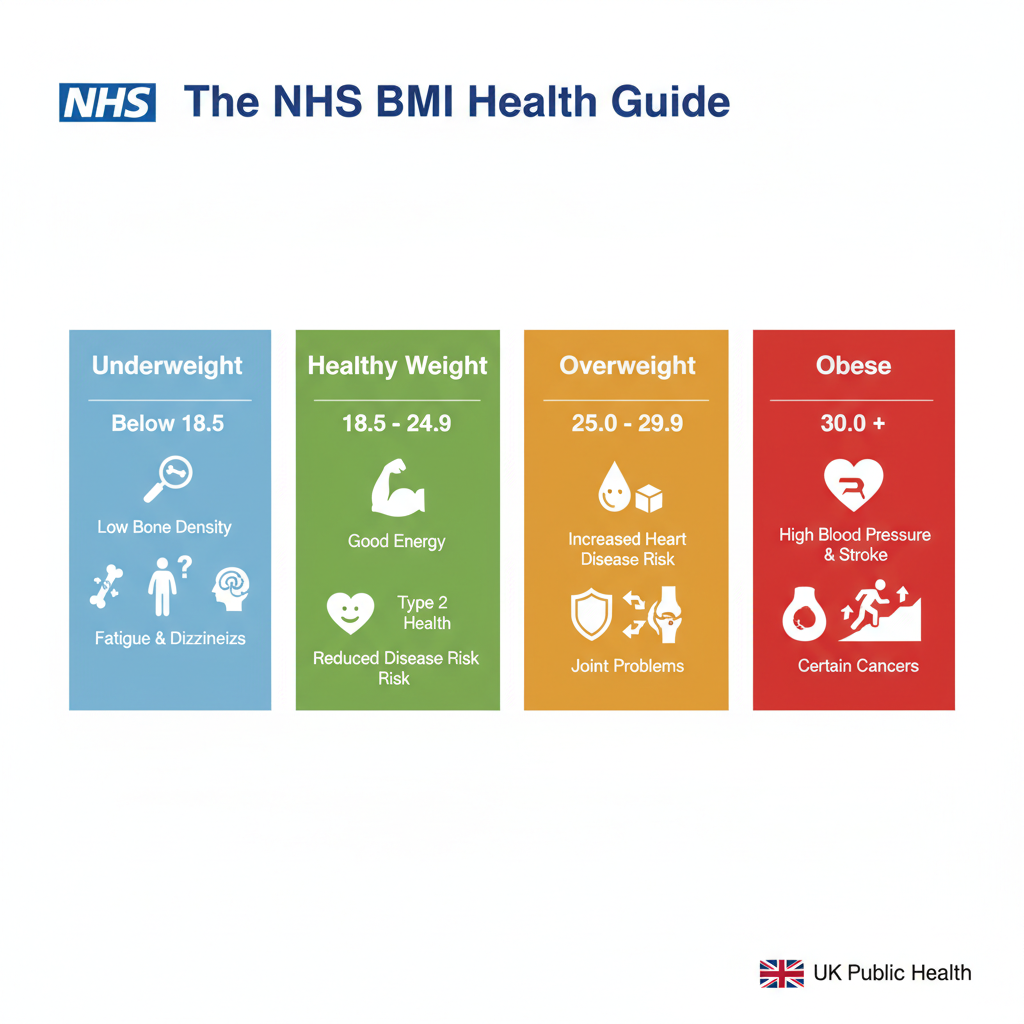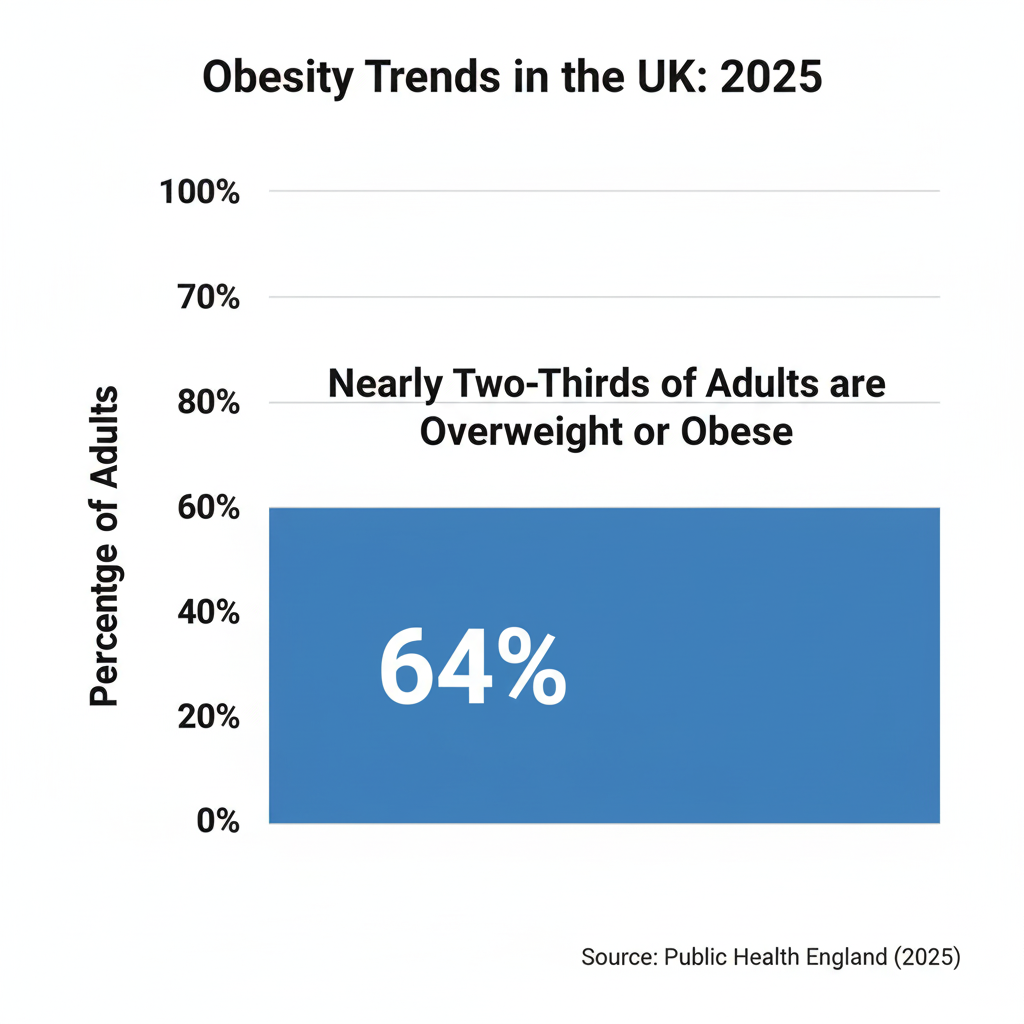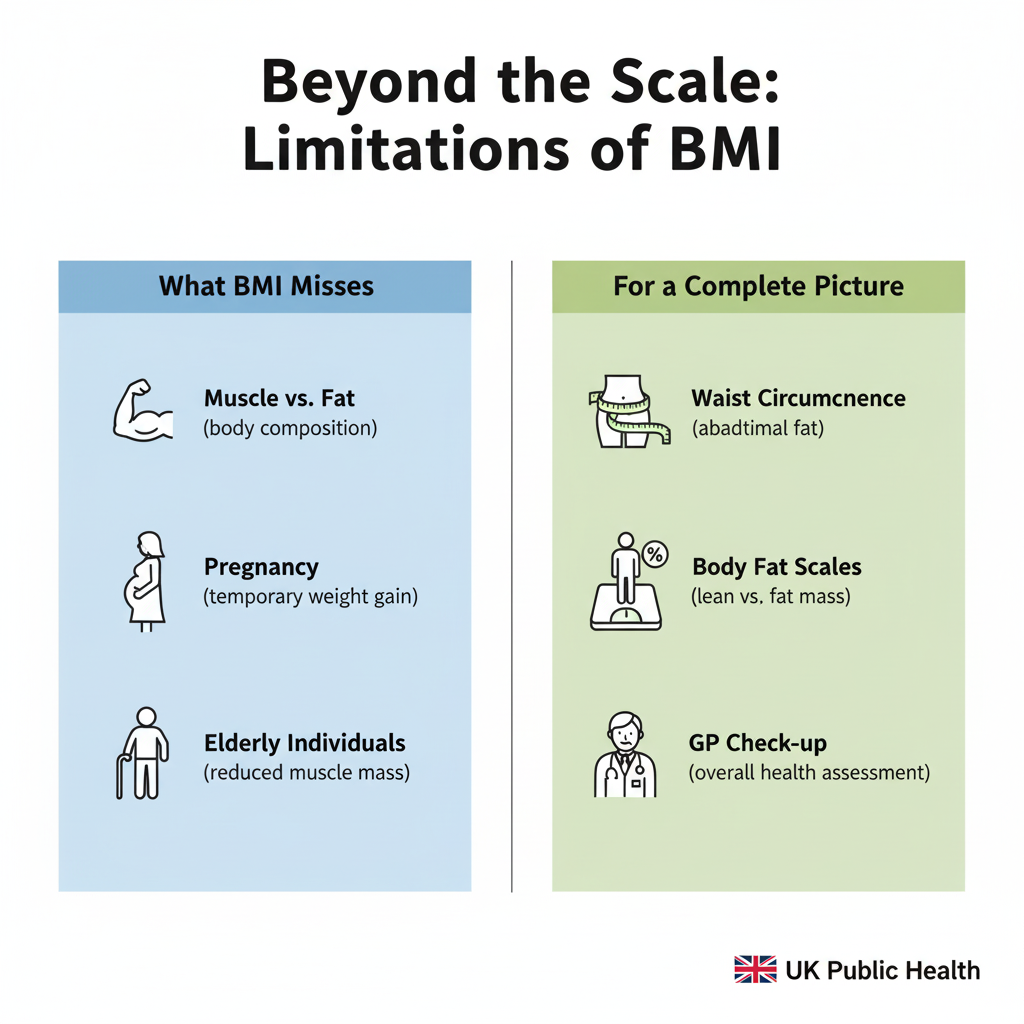BMI Calculator
Use the converter below to switch to accepted units.
Please convert units before using BMI calculator above.
Explore other calculators
You can check our other calculators to calculate different things.
Understand Your Health with the BMI Calculator NHS
The BMI calculator NHS is a free online tool from the National Health Service that measures body mass index to assess whether your weight is within a healthy range. Designed for adults and children, the calculator provides personalized results based on height, weight, age, and sex. It helps individuals monitor weight-related health risks such as obesity, diabetes, and heart disease, making it an essential resource for managing long-term well-being.
What is the BMI Calculator NHS?
The NHS BMI calculator is a public health tool designed to help individuals understand their weight in relation to their height. The concept of BMI, or Body Mass Index, is a simple metric-based formula: weight in kilograms divided by height in meters squared (
BMI=weight(kg)/height(m)2
). The tool, endorsed by the National Health Service, provides a quick and accessible way for the British public to get a general indication of whether their weight is in a healthy range.
It’s a crucial first step in a broader health conversation. The NHS uses it as a screening tool to identify individuals who may benefit from further health assessments, such as blood pressure checks or blood tests for diabetes risk, both of which are common concerns in the UK.

How to Calculate BMI?
Understanding how to calculate BMI is key to interpreting your health status. The formula is:
Metric: BMI = weight (kg) / height (m)^2
Imperial: BMI = (weight (lb) / height (in)^2) x 703
For example, if you weigh 70kg and are 1.75m tall:
BMI = 70 / (1.75 * 1.75) = 22.86
This value falls within the “healthy” range. While you can do the math manually, using the BMI calculator NHS simplifies the process and ensures accuracy.
Understanding BMI Categories
The NHS categorises BMI into the following ranges to provide clear guidance for the public:
Underweight: Below 18.5
Healthy Weight: 18.5 – 24.9
Overweight: 25 – 29.9
Obese: 30 and above
These categories are not arbitrary; they are the result of extensive epidemiological studies linking BMI ranges to specific health outcomes. They serve as the benchmark for a range of NHS weight management programs and public health campaigns.
Why Use the BMI Calculator NHS?
Unlike many generic online calculators, the NHS BMI calculator carries a significant degree of trust and authority. Its reliability stems from several key factors:
Official Endorsement: The calculator is hosted on and maintained by the official NHS website, a trusted source for health information in the UK.
Widespread Use: It is the standard tool used by General Practitioners (GPs), dietitians, and public health nurses across the country.
Alignment with National Guidelines: The categories and guidance provided are consistent with the UK’s National Institute for Health and Care Excellence (NICE) guidelines for weight management.
When you use the official bmi nhs calculator, you can be confident that the results are credible and align with the advice you would receive from a UK healthcare professional.
The Nuances: BMI for Adults vs. Children in the UK
A common misunderstanding is that the BMI calculation is a one-size-fits-all solution. However, the NHS approach is more sophisticated, especially for younger demographics.
For Adults: The standard formula is used for individuals aged 18 and over. While a simple measure, it’s widely used in the UK for its convenience and broad applicability. However, it’s vital to remember its limitations; for example, a professional rugby player with high muscle mass may have a “high” BMI but a very low body fat percentage. In such cases, a GP would consider other metrics.
For Children and Teens: The NHS uses a different, more nuanced system. Instead of fixed categories, a BMI-for-age percentile is used. This system, which accounts for age and gender, is a more accurate way to assess a child’s weight status, as children’s body composition changes as they grow. The percentiles provide a more accurate picture, allowing healthcare providers to track a child’s growth trajectory over time.
Critical Insights: The Limitations of BMI
As a financial and tax expert, I appreciate the need for clear, contextual data. In the same way that a single financial ratio doesn’t tell the whole story of a company, BMI has its limitations. It’s a screening tool, not a diagnostic one.
The tool doesn’t differentiate between fat and muscle, nor is it suitable for pregnant women or elite athletes. This is where other measurements, such as waist circumference (a key indicator for central obesity and associated health risks in the UK), can provide a more complete picture. The key is to use the nhs bmi calculator as a starting point, not the final word.
According to a 2024 report by Public Health England, nearly two-thirds of adults in the UK are either overweight or obese, contributing to a significant burden on the NHS. A high BMI is a strong indicator of an increased risk of:
Type 2 diabetes (a major focus of NHS prevention programs)
Cardiovascular diseases
Certain cancers
Conversely, an underweight BMI also poses risks, including nutritional deficiencies and a weakened immune system. By regularly using the bmi calculator uk, you’re not just getting a number; you’re engaging with a tool that can help you proactively manage these risks.
Risks of Being Overweight
Using a bmi nhs calculator can help highlight health risks associated with being overweight, such as:
High blood pressure
Type 2 diabetes
Heart disease
Sleep apnea
Certain cancers
Depression and low self-esteem
Understanding these risks can motivate lifestyle changes. A simple check with the BMI calculator NHS might be the first step toward improving your health.

Risks of Being Underweight
Conversely, being underweight also comes with its own set of risks:
Nutritional deficiencies
Weak immune system
Infertility or menstrual irregularities
Bone density loss and increased fracture risk
Fatigue and general weakness
By regularly using the nhs bmi calculator nhs, individuals can keep tabs on their health and take action before problems arise.
Healthy Lifestyle Tips Based on BMI
Your BMI calculator NHS result can guide your next steps. Here are some general tips:
If Underweight:
Increase calorie intake with nutrient-rich foods
Include strength training in your routine
Consult a dietitian
If Overweight or Obese:
Eat a balanced, low-calorie diet
Incorporate daily physical activity
Reduce sugar and processed foods
Get regular health screenings
Whether you’re maintaining or changing your weight, the BMI calculator NHS is an excellent reference.
BMI and the UK Population
Obesity is on the rise in the UK. According to Public Health England, nearly two-thirds of adults are overweight or obese. The bmi calculator UK is becoming more important than ever in helping people monitor their health.
Using the BMI calculator UK regularly can increase awareness and encourage healthier lifestyle choices. The government and NHS promote its use to help reduce healthcare burdens and improve quality of life.
Complementary Tools and Measurements
While the BMI calculator NHS is a powerful tool, pairing it with other methods gives a clearer picture of health:
Waist circumference
Body fat scales
Fitness level evaluations
Medical check-ups
All these help in painting a complete picture and guiding informed decisions.

How Often Should You Use the BMI Calculator NHS?
It’s a good idea to check your BMI every few months, especially if you’re on a weight loss or fitness journey. The bmi nhs calculator is accessible online, free, and takes less than a minute to use.
The BMI calculator NHS is more than just a number-crunching tool. It’s a first step toward understanding and improving your health. By using the nhs bmi calculator nhs and being aware of your weight status, you can take proactive steps to live a healthier, happier life.
Whether you’re wondering what is bmi, or actively trying to understand how to calculate bmi, this tool provides clarity and confidence. Embrace a healthier lifestyle today by checking in regularly with the BMI calculator UK.
Stay informed, stay proactive—and let the BMI calculator NHS be your trusted guide toward better health.
Conclusion: Your Proactive Role in UK Health
The nhs bmi calculator nhs is a powerful, free, and accessible tool for the UK public. It serves as a vital first step in a journey toward better health. By understanding what it is, how it’s applied in a UK context, and its limitations, you can use it as a reliable guide.
Don’t just calculate, contextualise. Use the result as a prompt for a broader health conversation with your GP.
Complement with other data. Consider waist circumference and other health metrics for a holistic view.
Engage with UK health entities. The NHS website and local public health services offer a wealth of reliable information and support programs.
Whether you are trying to understand your weight status or proactively monitor your health, the bmi calculator uk is an indispensable tool. It empowers you to take control of your health journey, aligning with the UK’s broader public health goals of fostering a healthier, happier nation.
